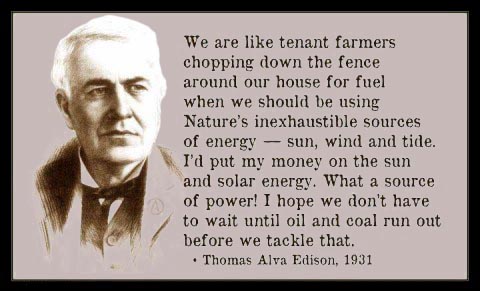SolTech on Sol Shine
Solutions towards sustainable Tech

At the distance of Earth, the sun is relatively benign. It is not all about extreme power, crazy speed, or explosive growth. It is steady, it is there, it has served life well for nearly 4 billion years and is likely to continue to do so for another billion years until it goes red giant. Until then, our sun is a sustainable presence to hitch humankind's wagon to. It is perhaps the only Earth-friendly (life-friendly) source of energy. Meteors can cause a splash, earthquakes and volcanism get our attention, but most nucleated life (not wedded to deep sea thermal vents) depends on Sol. The sun is not broken, is not in need of fixing, so there may be no imperative to find 'better' alternatives. Solar is not alternative. Fossil is the alternative energy currently fueling explosive industrial growth and it will not last for a billion years.
Nuclear is alternative, but it could be the death of us. Then there is fusion, as in possibility of...., but it is still vaporware. Yet we already have a fusion reactor that is just 93 million miles away. We humans might consider depending on it as the exponential fossil-fueled growth of the past three centuries, fueling ever more consumption and profits, is just a passing flash not to be depended on. Peak fossil will pass and oxidizing all that remains to turn it into carbon dioxide may extend the flash for a few milli-millennia, but doing so will not have a happy ending.
So transition to a non-fossil-fueled world sooner or later. Adapt now while the adapting is easy, or try latter when the going gets tough and be more apt to fail.  The maladaptive tend to reduce their representation in future generations. We live in a Fossil-fueled Culture. It is not sustainable over time geological.
The maladaptive tend to reduce their representation in future generations. We live in a Fossil-fueled Culture. It is not sustainable over time geological.
Maybe cold fusion will save us; maybe not. Sol is there, is a known quantity; life can live with it. Solar energy may not make humans rich beyond the dreams of energy avarice, but energy does make the world go around. You gotta have it—if not ever more and more then enough.
So bet on Sol or bet on the pointy-headed ones pulling a technological rabbit out of their hat. Maybe they will; maybe they won't—you bet your life and the life of your descendants (if any). If growth were somehow maintained, Earth would be roof tops and pavement from sea to plastic sea, so maybe we should reconsider what we wish for. Solar will not fuel exponential competitive growth and profiteering without limit, so don't expect support, muchless leadership, from the powers that be. If this seems harsh, well, it is, so consider transitioning to a less high-power, hyper-consumptive life.
Uses of Sun
If cold, sit in the sunshine. Heating when heat is needed is an obvious use. Ask any lizard. Solar hot water is obtainable. Evacuated tube technology makes hot water even in sub-zero places. Space heating is one use, cooking is another. And using Sol to cook with is doable whether used directly or indirectly such as by burning (efficiently of course) sustainable biomass like our ancestors have for about a million years.
Much of life as we know it depends on electricity even more so than fire. Using electricity to heat a house is an extravagant waste. The amount of sunshine that would have to be tapped for electric heating would be vastly greater than collecting and storing the heat to begin with. To avoid maladaptive extravagance, think modest super-insulated dwelling spaces, and then heating by sunshine becomes quite doable.
So think in terms of moderating electric usage to meet actual needs and photovoltaic systems work. Wants know no limits and cannot be met, so converge upon identifiable needs rather than pursue an infinity of wants. Current thinking is to install vast solar arrays on home roof tops (by the affluent who can afford to with taxpayer subsides) to partially meet their 24/7 demands and feed any excess to the grid to lower the electric bill, all without making any concessions to moderation. Going solar in such a manner may feel good, like driving a 416 hp Tesla whose acceleration “pulls back the edges of your face,” but that doesn't mean doing so is good. First, question assumptions, then think and rethink again.
Utility companies, the purveyors of centralized industrial energy over whose distribution they have been given monopoly rights, view grid-tie solar homes as threat number one to their business model. They demand that homeowners wanting to feed the grid pay for the right to do so either by selling the energy they produce to the utility at a low 'wholesale' rate while buying it back at full retail, or by paying a monthly fee to connect with the grid. The argument is that grid-tie solar system owners (less than 1% of homes) are expecting electric on demand during off hours but are not paying their fair share, all while expecting the 99% to pay more than their fair share. If all goes well for the power companies, distributed small-scale energy competitors will be crushed and made to go away.
One response would be to go solar but to go off-grid even if you live in the middle of the city. Produce your own electricity, such as you deem needed, and live with what you have when you have it. Live the high-power life, but only part of the day. To make this option work, question whether having all the power you could possibly want whenever you might want it is a good thing, much less a needed thing. It is profitable to others to make you think it is, and decades of relentless adverts may have done their job, but if "moderation in all things, including moderation" (on occasions) seems sane, then off-grid electric may work for you.
Land Sailing
The seas have been sailed for millennia by tapping ongoing wind energy generated by differential heating of Earth's surface by Sol. During a solar eclipse a wind accompanies the moon's shadow due to its cooling effect on the atmosphere. Sailors have sailed bodies of water big and small for as long as there have been sails in some form or another. Sailing technology evolved allowing for global travel by waterway.
Wind sailing the land masses has been done on dry lake beds, but to effectively sail on land requires tapping into something other than atmospheric wind. Some boats have been covered with solar panels that are used to drive an electric motor's prop, and such vessels can circle the globe, but they are doing so using the solar wind directly that bathes half of our world each day. Land sailing involves tapping the solar wind to drive wheels instead of props, and such vehicles can cross continents. In its transient way, fossil fuels have allowed vessels to more quickly cross oceans and continents using energy that is but a flash in our industrial pan. From the stand point of a few human life times, fossil may seem forever, but the aeons pass as seconds, and the Fossil-fueled Culture will pass as a blip in time.
Sailing vessels will again ply the seas as slow sailing is better than staying in port when the diesel/coal/oil/gas runs out. Animal power fueled by sun grown plants may allow travel by land, and such travel may be better than no travel, but solar panels are like sails, they allow a different form of wind to be tapped. They can use photons, via the photoelectric effect, to turn wheels, thus enabling land sailing using the photonic winds without any need to tack into them.
Solar panels may seem too high-tech to depend on, but woven sail fabric, compared to stitched together animal skins, is high tech too. As solar power could be used to produce solar panels, solar panels, like canvas, could be around for millennia. Solar sailing by land and by sea may be slow but better than walking. Instead of hitching our wagon the to a barrel, barrels, and more barrels, perhaps hitching up to the neighbourhood star will better serve our long term interests.
A human who rides a
solar bicycle across the USA, packs it up for shipping and
flies home, who takes over a
dozen products she has been paid to promote (such as
a blender, personal care products, clothing, dietary
supplements, $1,200 worth of unneeded electronic gadgets,
proprietary solar panel) is normal. To pedal a bit over 4
hours
a day averaging 17 mph to go from hotel to motel to bed
& breakfast while eating in restaurants to promote
"health" and "alternative energy" as a "sustainability
advocate" is to be perfectly normal and universally
admired for
the way she flies into the light. E-bikes are starting to
look like a new growth industry and the moths are gathering.
[read less]
Articles:
Electric Bike Related (If you're sure the whole point is to go faster, hit back button now.)
The Limits of Human Power: For average humans, why bicycle technology fails
What is an E-Bike?: Defining the nature of the beast—legally and otherwise
A Guide to Low-Power Cycle Tech: Why low-power may be good power and better than no power
A Guide to Mid-Power Vehicles: The Mid-Car
The SolTech Solar eTrike: Solar-Human hybrid powered touring trike
Hub Motors and Regenerative Braking: Why regenerative braking is useless—or essential to have
Car2: A second car alternative
Cycling Health and Safety: Benefits outweigh manageable risks
Cycling Power and Speed: The Power of Enough
Why SolTech has No Customers: The client-based open-source business model
On the Superiority of Human Power: When the hoof is mightier than the wheel
On the High Cost of Pioneering: To e-cycle or not to e-cycle, it's not all about the money
Cycle Theft: Dealing with it
Geek Out Your Bicycle Helmet: Why protecting your skull is too little to ask of your helmet
Deciding Who to do Business With: SolTech on businesses to do business with
Decision Path Leading to Buying an E-Bike: Which e-bike or conversion kit to buy is a non-trivial decision
SolTech on Li Batts: Why overcharging is the norm
Solar Related
Solar E-Trike Touring: The options depend on human power
The SolTech Solar eTrike: Solar-Human hybrid powered touring trike
Going Solar: Saving the life of seldom used batteries
Sun Tour the Americas by Solar Power: Solar-Human hybrid powered touring site
Solar Cooking Options: Solar slow cooking site
The Post-Car Culture: Why the passing of another Golden age is thinkable
Product Reviews
Greenspeed Magnum Trike
All American SUN OVEN®
Bionx E-motor System
Falco E-motor System
Solar Security Devices
News from Future:
From 2153 comes From Horses to Ecycles: A brief history of vehicle regulation
From 2357 comes The Future of Transportation:
How transportation needs were met
Affiliations:
We are sponsors of SunTourAmerica.org
We cook with SolarSlowCooker.org
We consider Plan B at Sustainability Issues
We nomad with SolMad.net
Products/Product Development
Khartu
Khartu Travel Trailers
Greenspeed Magnum Accessories
Geeked Out Cycle Helmet
Recumbent Tow Package
Recumbent Pet Carrier
Indirect Evaporative Cooler
Mobile Solar Generators
SolTech Greenhouses
Solar Freezer/Icebox
Tinyer Home Trailers
Multi-story Sheds
SolTech Solar Ovens
SolTech Aquaponics Systems
Tensegrity Pools
Rainwater Catchment Tanks
Sunken-bed Irrigation System
Trellis Arch Vertical Garden
SolTech Wall Garden
Composting Toilets
Vermiculture Bins
Poultry Palace
Urban Micro Farm Incentive Program

